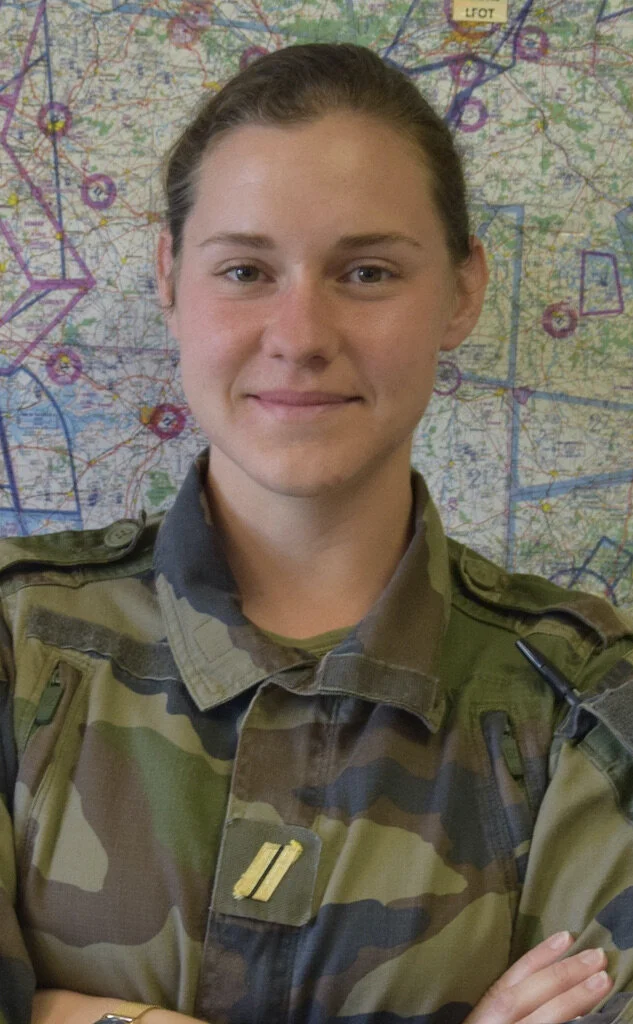Sergeant Titaua
Titaua, at the Ist Hunter Regiment in Thierville. Photo credit: 2nd Lt Morgane/French Army
Titaua (pronounce Titawa with emphasis on the first syllable) left her native island of Taha’a (between Tahiti and Bora-Bora in French Polynesia) at 19, swapping her sarong for army fatigues. Ten years later she is an NRBC (nuclear, radiological, biological and chemical) mechanic in the 1st Hunter Regiment (1er régiment de chasseurs). “I wasn't too interested in studying and wanted to do something instead of spending my days hanging around outdoors. On top of which I didn’t want to stay in Polynesia and wanted to be closer to my sister, who’d been adopted in France,” she explains. Some of her acquaintances, who were in the reserves, “encouraged me, helped me with the application formalities and prepared me, especially for the physical part by making me run and do suspensions,” she laughs.
She can clearly recollect the day in 2011 when she landed in mainland France, fear in the pit of her stomach, to join the 2nd Dragoon Regiment, specialized in the fight against NRBC threats.
““I wasn’t too interested in studying and wanted to do something instead of spending my days hanging around outdoors””
The choice of this regiment was not made by Titaua. “I was up for anything and I was offered this so I went,” she says simply. She readily acknowledges that “this regiment offers real opportunities for those who’ve have years of further education,” but that for her “apart from specific NRBC courses [such as the protocols for undressing or cleaning a vehicle following contamination], I remained versatile, a non-specialist.”
She became a pilot of one of the 25 NRBC VABs, an armoured reconnaissance vehicle modified to recognise, analyse and alert the chain of command in real time to the NRBC situation. With her three team-mates, her missions consisted either of moving ahead of the troops reconnoitring, that is to say, checking that there was no NRBC danger, or undertaking reconnaissance in areas known to be contaminated; they would also gather nuclear and chemical intelligence for the command chain as well as doing simple surveillance tasks.
The vehicle is instantly recognisable because of the large rectangular box at the back which allows samples to be taken automatically both whilst the vehicle is stationary and on the move thanks to “arms” controlled by an operator from inside the vehicle; radiological detection equipment is housed in “bubbles” on the sides of the vehicle. Once the soil or air samples have been taken, they are analysed in the vehicle and if a danger is detected it is marked by a beacon set down automatically on the ground by the vehicle.
It was whilst Titaua was with this regiment that she was deployed to … Tahiti! She spent four months there, ready to provide humanitarian aid in the event of a cyclone, for example, “but everything remained calm during my deployment,” she smiles.
When she returned she requested re-training to become a mechanic on what she calls the “NRBC engine” but which is, in fact, the ventilation and air pressurisation system inside the vehicle. Obviously, in an area where there is suspected NRBC contamination, the vehicle’s occupants should not be breathing unfiltered air.
Titaua working on one of the regiment’s VBL vehicles. Photo credit: 2nd Lt Morgane/French Army
At the end of 2019 Titaua changed regiments and joined the 1st Hunter Regiment because “my man, a non-commissioned officer, who was, like me, in a combat squadron, requested a change to become a fire advisor in this regiment and I followed because we are married.” She adds that “life had become very complicated with our two young children because someone had to look after them and my man being from Réunion, neither his parents nor mine are around for babysitting duties! Now things are a little calmer.”
Titaua spent two months in the secretarial services when she joined the regiment at the end of 2019 whilst waiting for a mechanic’s position to become available. Today she does maintenance on the regiment’s 122 VBL light armoured vehicles as well as on small NRBC equipment, such as masks, because any French regiment, even if not specialised in the fight against NRBC threats, is nevertheless equipped with basic equipment. There are four of them in the workshop.
The young woman is not the only Polynesian in the regiment and she admits that it is very pleasant to be “hang out together”. This somewhat compensates for the fact that she cannot return to Polynesia very often because the free passage concession that the armed forces grants to soldiers from overseas (or those from the mainland on deployment overseas for at least two years without their family) every three or five years is shared between her “home” and that of her husband in Réunion.
She giggles at the suggestion that Polynesian women, known to be the boss at home, belong in the military. “Women are put to the test every day, both in the military and in civilian life so it's not easy every day. But it’s up to us not to let this happen,” she says, adding that she intends to continue in the army until she is eligible to retire after 17 years of service. By then will she have taken the leap to become a non-commissioned officer? She’s thinking about it.





